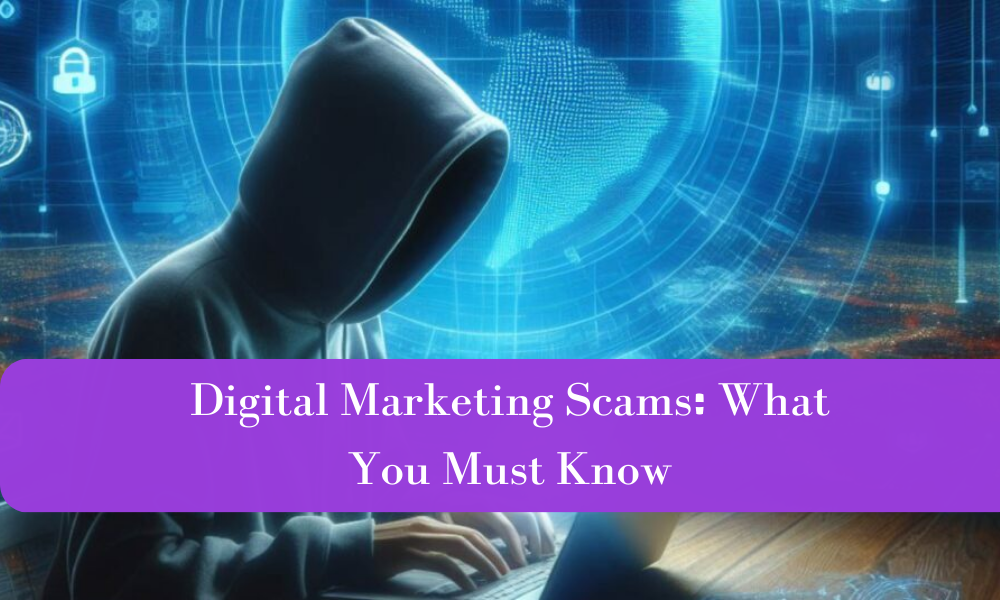Let’s be honest, stepping into the online world feels exciting, but also a little risky. You keep hearing about businesses that doubled sales through social media ads or SEO. At the same time, there are stories of people losing thousands to shady experts.That’s the tricky part: digital marketing scams look polished and convincing, but they leave you broke and frustrated. No wonder so many people ask, Is digital marketing a scam? In this post, we’ll break down the sneaky tricks scammers use, how to spot them, and why the answer to Is digital marketing legit? is still yes.
Why Digital Marketing Attracts Scammers
The internet has become a goldmine for businesses, but it’s also a hunting ground for fraudsters. Scammers thrive because:- Many business owners lack in depth knowledge.
- The promise of fast results sounds tempting.
- Online transactions make disappearing easy.
1. Fake SEO Services
Some agencies promise you’ll rank #1 on Google in just 30 days. That’s unrealistic. Search engines rely on long-term strategies like quality content and trend analysis, not magic tricks.2. Paid Followers and Likes
Buying 10,000 Instagram followers for $50 might sound appealing, but most of these followers are bots. They’ll never engage, and your brand reputation will take a hit.3. Email List Scams
Be cautious of services selling verified email lists. Often, these lists are full of outdated or fake addresses. Sending bulk emails to them can even get your account flagged as spam.4. Overpriced “Secret Formula” Packages
Some so-called experts pitch a unique system to triple your sales overnight. These are nothing more than recycled tactics you could learn for free.5. Disappearing Agencies
Perhaps the worst digital marketing scam is when an agency collects upfront fees and vanishes without delivering. This often happens with freelance marketers who have no verified track record.Red Flags to Spot an Online Marketing Scam
The good news? You can avoid most traps if you know what to look for. Watch out for these red flags:- Guaranteed overnight success. Real growth takes time.
- No transparency. If they avoid showing you how they’ll work, that’s suspicious.
- Pushy sales tactics. Scammers often create urgency to pressure for quick payments.
- Too cheap to be true. If the service costs less than a dinner but promises millions in sales, something’s off.
Is Digital Marketing Legit?
This is the question most business owners ask when they get burned by a scam. The truth is, yes digital marketing is legit. Thousands of businesses thrive because of it. Digital marketing isn’t the problem. The problem is the shady people who use it the wrong way. Think of it like buying jewelry you’ll find real diamonds, but you’ll also find plenty of fakes. The challenge is learning how to tell which is which.How to Protect Yourself From Digital Marketing Scams
You don’t need to be a tech wizard to protect your business. A few smart steps can save you money and stress:Do Your Research
Spend some time reviewing their prior work and evaluations before hiring them. Doing a quick background check now can save you a lot of trouble later.Ask for Clear Metrics
Instead of vague promises, insist on real numbers. For example:- Website traffic increase percentage
- Conversion rates
- Cost per lead
Verify Their Methods
If an agency avoids explaining its process, that’s a red flag. Reliable marketers will walk you through their targeted campaign strategy and use proven trend analysis.Start Small
Before signing big contracts, test their service with a smaller project. This way, you minimize risks.Real-Life Examples of Victims
Consider this: A small bakery owner paid $2,000 to boost her online presence. The agency promised 50% more sales in a month. What she got instead were 5,000 fake followers and zero engagement. Another case? A local gym hired a freelancer who disappeared after receiving half the payment upfront. These stories are all too common, and they leave people asking, Is digital marketing a scam?What Real Digital Marketing Looks Like
To spot the difference, here’s what genuine digital marketing provides:- A long-term growth plan, not overnight promises.
- Focus on organic engagement rather than shortcuts.
- Detailed reports with clear metrics.
- Custom strategies built for your specific goals.


